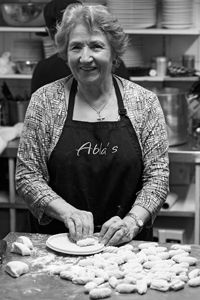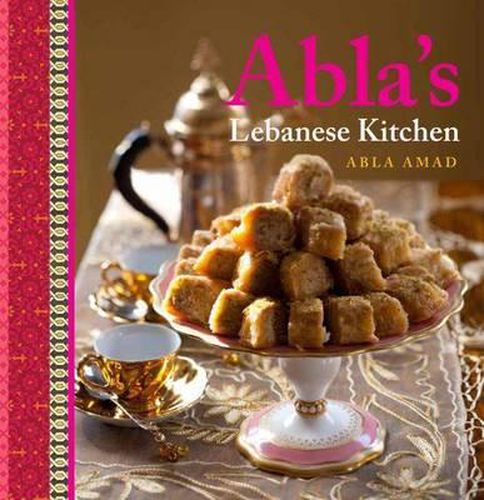Abla Amad

On the eve of the publication of her new cookbook
, Abla’s Lebanese Kitchen,
legendary Carlton restaurateur Abla Amad took the time to chat with Readings’ resident foodie, Joe Rubbo, about her approach to cooking, the history of her restaurant, Abla’s, and her new book.
I arrive at Abla’s late on a Friday afternoon. In the dining room, a few tables of diners still linger over coffee and Lebanese sweets. If you haven’t yet dined at this landmark Melbourne restaurant, then I suggest you do. By coincidence, I was here the night before and enjoyed a terrific meal that was entirely consistent with my memory of the last time I ate here. As a customer once told the restaurant’s owner, Abla Amad: ‘Every time I come here the experience is as good as the last, if not better. Abla, I never want you to change.’ It’s true. I don’t, either. I met Abla that night, too – she still does the rounds of the tables to thank diners for coming – and told her I’d be there the next day to interview her. ‘Good,’ she said. ‘I knew someone was coming and I’m not so nervous now.’
In 1979, Abla’s late husband, John Amad, helped her secure the current restaurant location on Elgin Street and, encouraged by supporters and admirers of her cooking, Abla opened the doors. It’s still going strong. Thirty years in business is an amazing achievement in this notoriously fickle industry: a testament to Abla’s skill in the kitchen, which she attributes to her husband’s passion for eating.
She still runs the kitchen, keeping watch over all the food preparation and service with an inscrutable eye for detail. When she emerges from the kitchen, she tells me they are busy preparing for the night’s dinner service: they are fully booked, upstairs and down.
She’s found the time to write a new book too, an updated version of her last, The Lebanese Kitchen. There are many new recipes in this handsome volume. Before we can discuss the book, Abla excuses herself to show it to two regular customers dining by the front window. They want to buy the copy I’ve brought with me – then and there. She has a faithful following, built over many years. In the introduction to her book Abla writes, ‘many beautiful customers have been coming to my place for a long, long time – some of them for twenty or thirty years – and now their children and grandchildren are coming along too’.
Abla came to Australia as a teenager in 1959. It was meant to be a holiday, but luckily for us, she stayed. When she first moved here, she lived with her uncle in Elgin Street, a few doors down from the restaurant. ‘He was a bachelor,’ Abla says, ‘and a good cook. I used to watch everything he did.’
Surprisingly, Abla learnt about Lebanese cooking here in Australia – from her uncle and from a group of older Lebanese women who gathered together to prepare meals for family and friends on weekend afternoons. Abla, out of respect and admiration, refers to these women as her aunties. She used to watch them and help prepare the traditional Lebanese dishes she still cooks today. Her education in cooking for loved ones translates into the generosity of spirit felt in the restaurant today.
She sees The Lebanese Kitchen as a way to pass on her knowledge of traditional Lebanese food preparation, telling me that ‘many young people, the new generation of Lebanese Australians, love the book’.
What’s not to love? It is full of great recipes, adaptable to many different occasions. I like the idea of making the Okra in olive oil with Lebanese rice as a simple mid-week meal. There are also great recipes for mezza – dips, pickles, silverbeet rolls – that are perfect to take to a picnic, or the baked quails for a dinner party.
For Abla, all these dishes recall memories. She remembers charring eggplants for her mother to make a smoky baba ghannooj, eating salads her mother prepared after collecting the silk from silkworms, or cooking garfish for her husband and his friends here in Carlton. These recipes are laced with stories and history: this book is a concise catalogue of an incredible woman’s life’s work.
In approaching these recipes, Abla emphasises patience, cleanliness, and that you show care in what you’re doing. ‘It doesn’t matter what you’re doing, you have to have your heart in it, whatever you do. If you force yourself to do something it never works. But I never, never once forced myself to cook.’
I asked Abla if she herself has ever used a cookbook. The answer was simple: ‘no, never.’ And why would she? But, for the rest of us, we could do a lot worse than having a copy of Abla’s Lebanese Kitchen on our bookshelves.



